2019 Georgetown University Press. All rights reserved. No part of this book may be reproduced or utilized in any form or by any means, electronic or mechanical, including photocopying and recording, or by any information storage and retrieval system, without permission in writing from the publisher.
The publisher is not responsible for third-party websites or their content. URL links were active at time of publication.
Library of Congress Cataloging-in-Publication Data
Names: Gentry, John A., 1949- author. | Gordon, Joseph S., author.
Title: Strategic warning intelligence : history, challenges, and prospects / John A. Gentry and Joseph S. Gordon.
Description: Washington, DC : Georgetown University Press, 2019. | Includes bibliographical references and index.
Identifiers: LCCN 2018018860 (print) | LCCN 2018033681 (ebook) | ISBN 9781626166554 (pbk. : alk. paper) | ISBN 9781626166547 (hardcover : alk. paper) | ISBN 9781626166561 (ebook)
Subjects: LCSH: Intelligence service. | Intelligence service--United States. | Military intelligence. | Military intelligence--United States.
Classification: LCC JF1525.I6 (ebook) | LCC JF1525.I6 G46 2019 (print) | DDC 327.12dc23
LC record available at https://lccn.loc.gov/2018018860

This book is printed on acid-free paper meeting the requirements of the American National Standard for Permanence in Paper for Printed Library Materials.
20 199 8 7 6 5 4 3 2 First printing
Printed in the United States of America
Cover design by N. Putens.
Cover image by iStockphoto/Getty Images.
Preface
The genesis of this book was the authors collaboration in designing and teaching the National Intelligence Universitys Strategic Warning Analysis Certificate Program. Joe Gordon founded and still teaches with the program. John Gentry was part of the instructional team in 201315. As part of course development processes, we discussed desirable readings and lamented that, while Cynthia Grabos Handbook of Warning Intelligence had attained the status of a classic in the intelligence literature, it was completed in 1971 and largely discussed the challenges of warning against Soviet bloc military threats. It therefore was dated. We discussed the possibility of a joint project to write a successor book. In the spring of 2016, after Gentry left NIU, we decided to write a book designed to describe and evaluate the expanded scope of strategic warning intelligence, the global spread of the warning function, the growing history of strategic warning, and the nature and causes of the continued intellectual and institutional challenges of strategic warning, especially in the United States. This book is the result of that effort.
We wrote the book under a division of labor roughly as follows. Gentry initially researched and drafted most of the manuscript. Gordon regularly reviewed and suggested changes in the draft; he focused on specific areas of information gathering and analysis, particularly sections on denial and deception and the warning activities of the North Atlantic Treaty Organization, the Netherlands, and the United Kingdom. Gordon also was our primary continuing contact with people in the US government. In general, both of us discussed warning with people knowledgeable about aspects of strategic warning, although in a few cases each of us alone interviewed experts.
We gratefully recognize many people who contributed to our understanding of strategic warning and to this book. Gentry remembers with fondness and gratitude the insights about warning he received from the then national intelligence officer for warning John J. Bird while working on a warning-related project as a Central Intelligence Agency analyst in 198487 and then on Birds staff in 198788. That experience greatly informed this project. Gordon recognizes Robert Kells, now retired from the Defense Intelligence Agencys warning staff, who helped Joe design NIUs Warning Certificate Program, tutoring on warning methodology and sharing an extensive bibliography. Many people helped this book project by providing insights directly, by recommending literature, and by reading portions or all of drafts of this book and a related article. We thank Richard K. Betts, John Bird, Major Christopher Browning (US Army), James Bruce, David Bush, Rory Cormac, Erik Dahl, Philip H. J. Davies, Commander Rory Dolan (Royal Canadian Navy), Robert Dunfield, B. G. J. (Bob) de Graaff, Thomas Fingar, John C. Gannon, Susan Gentry, Roger George, Kenneth Gerhart, Jay Honigstock, Arthur Hulnick, Robert Jervis, Kenneth Knight, Kevin Logan, Mark Lowenthal, William A. Parquette, Randolph H. Pherson, John Saxe, John Tolson, Gregory F. Treverton, Robert Vickers, James Wirtz, Ronald Woodward, several persons who do not wish to be identified, and two anonymous reviewers.
We acknowledge the students and guest speakers in the courses of NIUs Strategic Warning Analysis Certificate Program and members of the Defense Warning Network of the US Department of Defense who shared with us many insights and informative anecdotes. These people helped prompt us to write this book, and their contributions to our thinking are significant, although we mention few of their names herein.
We are grateful to Georgetown University Press. Donald Jacobs had confidence in our project and helped us get early drafts of this book into decent shape. Kathryn Owens managed the books production process skillfully. Don McKeon provided copyediting support. Andrew Buss proofread diligently. Virginia Bryant, Nikita Dsouza, and Cherylann Pasha provided marketing support. And Jackie Beilhart worked publicity.
Portions of , especially, appear in slightly different ways in John A. Gentry and Joseph S. Gordon, U.S. Strategic Warning Intelligence: History and Challenges, International Journal of Intelligence and CounterIntelligence 31, no. 1 (Spring 2018), pages 1953, reprinted by permission of Taylor & Francis.
This book was reviewed by security officials of the Defense Intelligence Agency, who approved its public release without change. DIA requires the following disclaimer statement: All statements of analysis or opinion are those of the authors and interviewees and do not reflect the official policy or position of the Department of Defense or any of its components, or the U.S. Government.

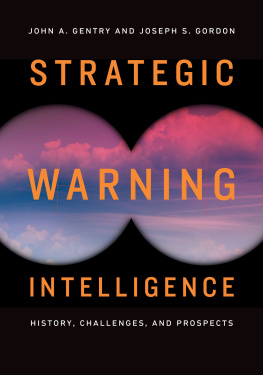

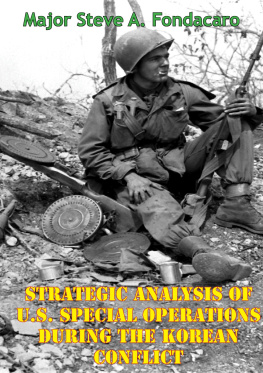
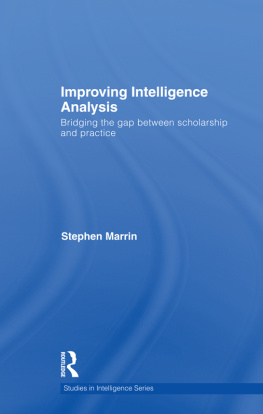

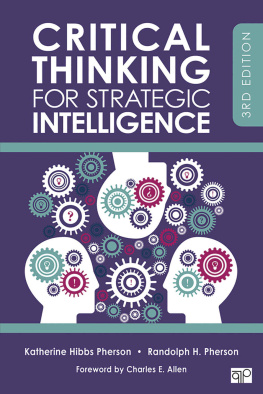

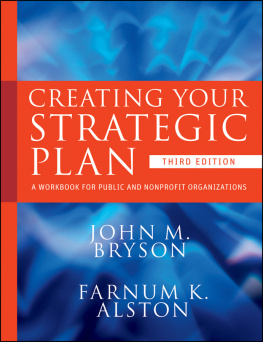
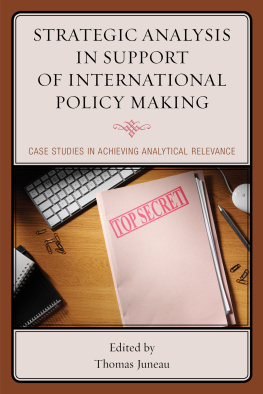
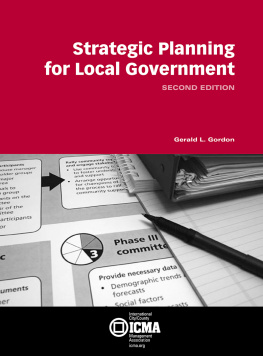
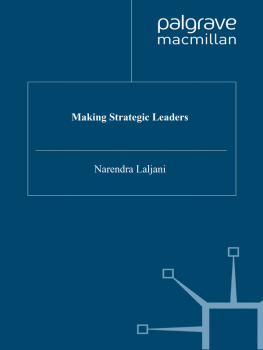

 This book is printed on acid-free paper meeting the requirements of the American National Standard for Permanence in Paper for Printed Library Materials.
This book is printed on acid-free paper meeting the requirements of the American National Standard for Permanence in Paper for Printed Library Materials.